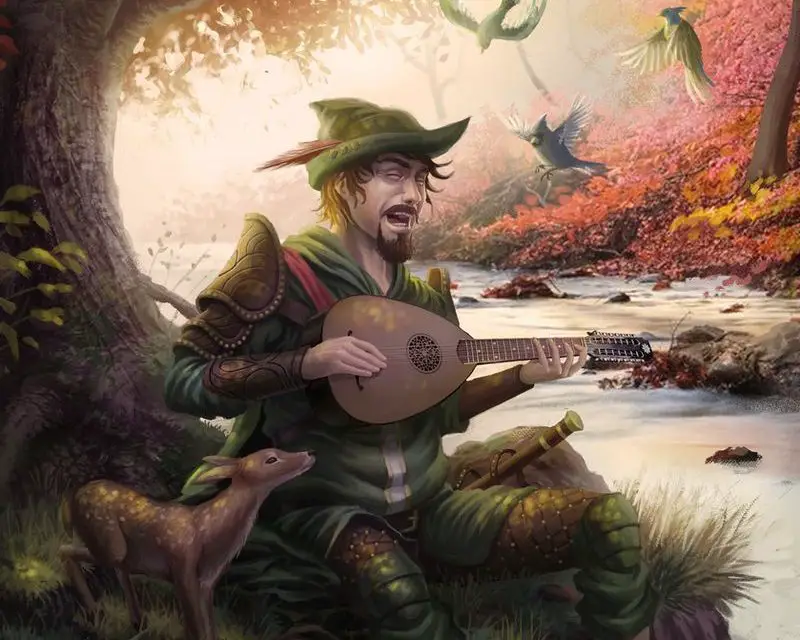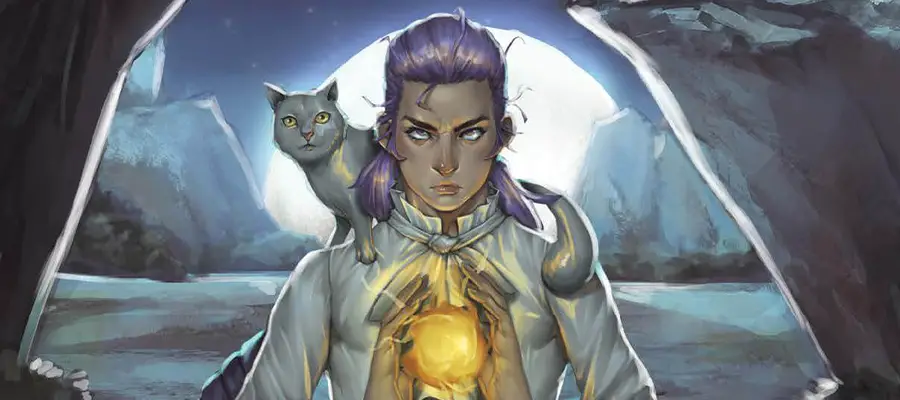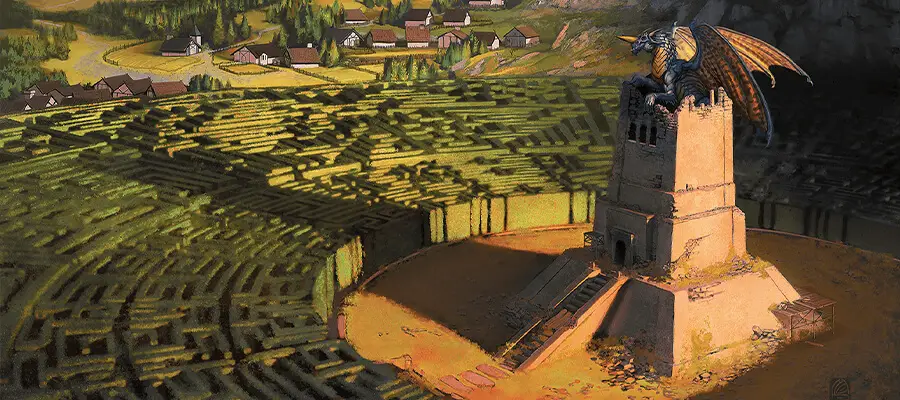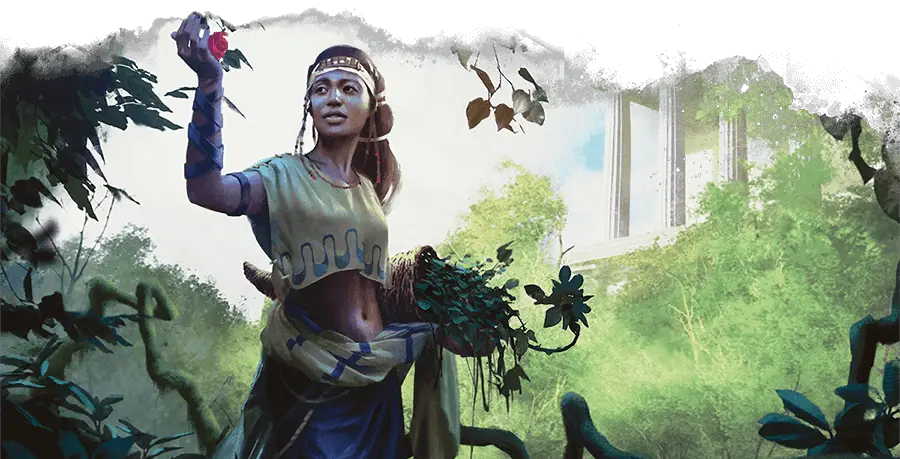Featured art by feintbellt. Creative Commons Attribution-Noncommercial-No Derivative Works 3.0 License
Update: I’ve included how to set up this sort of game mechanically at the bottom of the article as guidelines.
I’m going to be writing this article in a vastly varying style than usual. I have briefly play-tested my unusual concept of a Class-free Dungeons and Dragons game, but not enough to feel comfortable formalizing it into a module or manual. I’m asking for Flutes Loot readers to take a chance on this playstyle (one-shot or campaign) and report back to me, either via our various social media like twitter, facebook, instagram, reddit, commenting on this article, or messaging us from the form at the end of the article.
Please give this style a gander, try it out, then let me know what challenges you and your party faced, what successes you found, and what you modified to make it work. This is a hopeful and simplified playstyle ideal for players who may not like getting bogged down with 5th edition mechanics, or maybe this method would work well with children players or in other capacities like teaching life skills and lessons to youth. Let’s all collectively work to develop it! Thank you so much!
—Opal
Premise for D&D without Classes
It’s entirely natural for players to start their Dungeons and Dragons campaign with one particular expectation: I am going to be a hero. Not in a conceited “let me be in the spotlight” way, but in the “we are a party of heroes going to solve the world’s problems” way. Of course, there will be players with devious motives who turn out to be anti-heroes, but that’s just the other side of the same coin. In this mindset, players are still playing characters who will solve problems.
The issue with this mindset is that conflict often takes precedence over things like story-, character-, and world-building. For instance, a world could have a number of problems ranging from a band of orcs ravaging the countryside to cults and people in power puppeteering world governments to gods and demons planning to destroy the world. Players get in the mindset of finding the biggest threat, eliminating the threat, and moving on to the next problem.
And this mindset completely makes sense for at least two reasons:
- Story needs conflict. That’s the most basic concept in Literature 101. What would be the point of running a campaign if your players are not central to the big life-altering conflict?
- Players want to do cool stuff. Players intentionally build their characters to have abilities that can one-hit take down their enemies or to talk (or steal or barter or manipulate or hex) their way into a favorable resolution.
But here’s the big question of this article: What would a game of Dungeons and Dragons look like if we were to remove the abilities, spells, and skills of players? More specifically, what would a game look like if we were to remove the concept of Classes?
Example D&D Game without Classes
I ran a game like this for two players, one of which was Flutes. The two characters began the adventure as young brothers, ages 13 and 15, I believe. They were normal boys from an islander community: a portrait of two lives you or I could imagine living.
The campaign began with a shared memory the two boys had: at the end of a week-long religious ceremony of worshipping their gods, the boys’ father told a legendary story around the campfire, beating drums softly, about a champion with mystical powers. This opening scene established setting and context, but more importantly, possibility, some of which is more magical than physical.
Taking advice from the infamous Joseph Campbell’s A Hero’s Journey, I built a story that the players interacted with that set up a Call to Adventure, but it wasn’t in the form of “here’s a problem that the world is facing, you must solve this problem because you are the heroes.” These were just regular boys who wouldn’t be asked to solve any big problems, let alone have the skills to. Instead, the boys pursued ambitions they had—they sought adventure and were roped into a conflict that would involve them personally and eventually teach them skills to build their characters along the way.
Perhaps the end goal is a strange bastardization of 5th edition classes. As characters discovered how to do something, like solve a puzzle or scale a cliffside, they were “rewarded” (in a sense) with stat boosts and actual D&D skills like +1 to intelligence or proficiencies in athletics or a specific feat that matched what they achieved. This is more in line with most RPG video games, where you gain stats and abilities along the way. Think of it more like real life: the more experience you gain in a thing, the better you will become at it. If your player is in a dire situation and is forced to grapple a beast, maybe after they succeed, they gain a bonus to athletics.
In my game, there was a lot of on-boat downtime (as is the nature of an island adventure). There were a few NPCs with very specific specialties, like sword fighting or navigating, or even healing via herbalism. My players could choose what skills they thought their characters would want to pursue, creating a hybrid of classes without the nuances of multiclassing or following a formulaic leveling-up.
Honestly, this may have created an imbalanced system. As a Dungeon Master, I had to really understand their characters because things like Challenge Ratings didn’t matter. But this brings up a very interesting point: I don’t think I had them roll their dice for anything for the first few sessions, and then it was very limitedly after that (in-combat, for instance, they would roll as expected). This game was heavily role-playing, and the encounters they faced were solved by them explaining how their characters would respond to the challenges.
Plot spoiler alert: there WERE world-altering conspiracies in the works, and eventually, the players would have to face those, but only after they had developed their characters in terms of ability and confidence and personality and integrity. But think of this method of running the game as reading a fantasy novel. It’s highly unrelatable when the protagonists are already really good at things. It’s boring. You want to watch the characters develop. And when you’re playing the game (i.e., participating in writing the story), you will be developing your character as the story progresses.
So enough speaking generally. I’m going to give very specific ways in which a game like this can be run. Let’s continue to use my story from above. I apologize; this may be messy.
The boys already have a few skills. They have been able to run a small raft with success for long time periods and distances. That’s pretty expected for islanders in my setting. They help the family make money by crafting small things like basic obsidian daggers and small stone necklaces. They can catch fish pretty reliably, and they take small errands and jobs from locals, like transporting small amounts of goods between close islands.
The boys were scouted by a local merchant (whose identity is a mystery at this point) to take a designated small boat crew to a farther-away island and retrieve a very specific item from a newly-unearthed structure that rose from the ground in an earthquake, also known in this world as a “dungeon” (this ties into the legend their father told: ‘dungeon capturers’ overcome these dungeons and are rewarded by gods, more or less). The item they seek is powerful, but obviously, the boys don’t know this.
The boat has three crew members and a pet pig. As mentioned, the boys can engage with and build a relationship with these members over the course of a few days and thus begin to learn proficiencies like knot-tying, sword-fighting, and so forth, though these things will take a lot more practice to master. The crew will also encounter a storm, and the players will need to follow the captain’s orders and solve the problems creatively, perhaps, to overcome this challenge.
After arriving at a larger town than their own, they are outfitted with basic exploration gear (rope, pitons, food, though note that there is a low weight limit to these bags as the boys are young and may not carry as much as a typical adventurer), and are told to meet back at the docks at a certain day or they will be assumed dead.
A reader might stop me here and ask “why were two young boys sent to find this thing instead of a crew of highly-skilled heroes?” and I would answer: to be discrete. These young boys have a stake in making money for their family and will complete a job without asking too many questions (usually). They are a bit more unknowledgeable and therefore easier to manipulate. They won’t take the valuable item for themselves. Plus, there’s a surprise coming up.
Because this dungeon sprung from the ground recently, it is quite the spectacle for adventurers and the curious and is being toured by locals, officials, historians, and adventurers. The boys have a note of instructions from the merchant who apparently has some insider information. The note tells the boys to enter the dungeon with the rest of the tourists, but then veer left unnoticed and look for a lion-head knocker. The dungeon is overgrown with flora, and the knocker can be discovered after breaking off some vines climbing the stony walls.
Inside, two skeletons from former adventurers, decades deceased, lie near the door, implying that there is another way into the dungeon, as the boys entered through the back door. The skeletons give clues as to how to proceed: one has a broken leg, and the other seems to have crawled out of the next door and then died (venomous bite, but that’s not very obvious). One has a hatchet the boys can take (pro tip: gain your equipment in-game, not precursor to it), but they might be hesitant to touch a dead body more than that (as a Dungeon Master, it’s okay to let your players know how they might feel), and if they decide to anyway, they find nothing of note that they don’t already have in their packs.
Upon entering the next room from which the dead adventurers came and met their fate, lightly lit runes line the floor. Some tiles are missing, revealing a hole in the floor. If one of the boys steps on the wrong tile, they will fall into a bioluminescently-lit pool below and have to climb back and try again (apparently the adventurer’s broken leg was a result of the fall). The remaining runes indicate where to step via a logic puzzle (tiles that were hollow and fell when stepped on reveal additional clues), and the square tiers of tiles will shift around in a circular turn each time one is stepped upon.
This is a simple puzzle, dependent on the player’s ability to solve it and not on any dice rolls. This puzzle rewards brain over brawn, but brawn is still a part of it, as they must jump from tile to tile and not die when they fall into the water (they must swim out of the pool and climb back to the puzzle). This won’t necessarily add skills and proficiencies to characters, but it will help them hone in on what sort of person they want to become and what skills they want to develop (more on this later).
Quick interjection here about the dungeons. The Dungeon Master will know that these dungeons were once set up by heroes of gods to reward the greatest champions of the world with otherworldly supernatural power. There are many dungeons that will begin to pop up, similar to this one, but probably bigger and harder, which all have Trials of Faith to essentially find new champions. The plot isn’t very pertinent here, but if enough readers are interested, I may write this adventure into a module. Please reach out to me if you are interested!
Back to the story: because the boys went the back way, they didn’t have to encounter all of the dungeon traps that the other adventurers would have as far as they were concerned. In reality, the dungeon was already swept and traps deactivated by local officials and archaeological experts. Nevertheless, this is a neat little loophole to catering to low-level characters without compromising the integrity of your world-building.
The boys find an atrium with a glass roof. Torn portraits and overgrown potted plants line broken desks and shelves. The boys can search through these things and find more gear, journals, history, and more.
Instructions from the merchant mention finding the box in the heart of a large tree. There, the boys find a hollow with hatchet marks around it. The inside is empty. The Dungeon Master might remind the players that they found a hatchet on the deceased adventurers, maybe they’ll find what they’re looking for. They can go back and search the bodies, but they will find nothing, though they can perceive that the box they are looking for is up on a ledge in the water hole. It looks like a rogue tree root caught the box (that’s probably where the guy fell and broke his leg).
I threw in extra challenges as the boys tried to leave the dungeon, like one adventurer and his friend noticing the boys enter the secret way and either sneakily following them or waiting to jump them when they exited. Trying to get out of this fight (or opting to fight them), a giant spider climbs down from above and attacks the boys and the adventurers. The boys have a hatchet and some basic equipment. They can easily find clever solutions to either avoid the fight or defeat the spider, keeping in mind the threat of the guys who jumped them (though they are also in a pickle with the spider).
All in all, the kids make it back to the boat, the crew chuckles at how roughed up they look, a few non-combat encounters/events may happen while sailing, they take the box back to the mysterious merchant, and discover that it’s actually their grandmother, who is tied to the big grand plot involved with a secret society trying to restore lost magic to a magical race that has been oppressed as slaves for thousands of years. The boys happen to be partially of this lineage, and thus have the potential to regain this magic themselves naturally.
The grandmother bestows the item in the box to either boy: a necklace (a pounamu, to be exact) that bestows a limited amount of animal-esque abilities to the wearer (speed of a cheetah, swimming like a panther, etc. Determine what mechanically-convenient abilities they would gain as a result. Flutes wrote a great article that gives specific examples you could use).
This sets the boys off on a journey to discover more dungeons, even on their own island as one arises from the ground and destroys some of their beloved hometown. Through the adventure, the boys gain more magical powers, develop their own skills, and progress through a story of fighting for the oppressed.
Here are the skills my players chose to learn:
The younger was more interested in the humanities: navigating, diplomacy, beekeeping (animal handling, but he weaponized a cage of bees like the kobold race does), stone-cutting, and jewelry-making. Through his gameplay I was able to say things like “You are perceptive and calculating. You can determine how best to avoid getting hit through your wisdom” and bestow him the skill of Unarmored Defense. He also gained some Sneak Attack for knowing when to best strike his target with his obsidian dagger, and because he was a heavier kid, he quickly learned that he could use his heftier weight to his advantage in close-quarter grappling (gaining the Grappler feat).
The older brother was interested in commanding a sailing ship (water vehicles), mastering his flute (performance), swimming athletically, and displayed much charisma. While playing, he was less astute to solving problems or discovering traps to protect his little brother, so I said: “Annoyed that you were unaware of so many traps that could possibly exist, you become more cautious of traps.” and gave him the Dungeon Delver feat. He also gained the Mobile feat for his athleticism. As he worked on deciphering the books he found in the atrium, he later gained proficiencies in languages and eventually became a magic initiate.
As you can see, these two characters did not have specific classes, but I found skills from a myriad of official classes that could apply to the boys. Magic was another system that I never had the chance to fully develop, but I intended to teach the characters specific spells from each level as they progressed in their knowledge and skill.
Overall, I enjoyed the system of giving surprising abilities based on how the players played their character, all while giving them a choice on what sort of skills they were most interested in learning. The plot of the campaign was very personal to the characters and did not force them to solve problem after problem, but rather, allowed them to explore and discover a world they did not know, much as we do in our lives.
Starting D&D Mechanics without Classes
Start the campaign much like you would an adventure novel. Choose one distinct plot hook that ties each character to the adventure. Of course, each character has their own reasons for leaving the safety of their home, but what ties the group together?
To simplify the introduction, perhaps each member comes from the same village, are lifelong friends, peers, family, or rivals. Give each character their own Hero’s Journey, then kick them off on the adventure. For more information on what I mean, I’ve written an article on campaign creation tips that may interest you.
Stats
And now for the mechanics. Each player will start and level 0. They should choose a race, though gain no racial stat enhancements (recall that in Tasha’s Cauldron of Everything, any race’s stat bonus can be transferred to a new race), and give themselves stats (using the buying method) not how they would want to use abilities, but based on their personalities and backstory.
For instance, a class bully would have higher Strength, Constitution, and Charisma, but maybe lower Wisdom, Dexterity, and Intelligence (or as a complex character, perhaps their Intelligence is quite high!). A scrawny but clever fellow might have low Strength and Constitution but high Dexterity and Intelligence. These stats are meaningless toward what abilities they will have, so root that idea out of your players’ minds. Stats only correlate to the character personality.
When players meet their first milestone (and effectively hit level 1), a Dungeon Master may give characters stat bonuses equivalent to racial bonuses based on what they accomplished, how they did it, and what interests they took in the process.
Abilities
Imagine yourself (as a person, not a character) being called to backpack through the mountains of Tibet for some grand purpose personal to yourself. How would you fare? Perhaps you already have some survival skills, know how to handle a pack mule, and you are really good at cheering people on when their resolve begins to falter. You would be proficient in survival/nature, animal handling, and maybe persuasion. You likely aren’t a skilled fighter, but you know some things.
Transfer this expectation onto your character. Choose a background that fits your character’s personality and backstory. At level 0, all your character is is their background. Feel free to mix together and homebrew your own backgrounds, but keep your character open to the possibilities of what’s to come. Remember that your character’s abilities and skills will develop and be awarded based on your in-game interests and choices, so don’t limit your character in what they can become.
Equipment
This section may disappoint players, as the typical player loves their loot and equipment, but start your characters off with very limited equipment. Picture Bilbo Baggins leaving the Shire with several Dwarves. What did he carry on him?
Characters may have a short bow, a staff, a dagger, and possibly (very rarely) a short sword. Some characters may even know a cantrip or two, learned in idle time or passed on by their parents or mentors. A very nice DM might allow their characters one common magic item from home.
I imagine a character leaving home for the first time would have about 2-5 gp worth of equipment or gear. Have your players choose some basic equipment (not from a specific pack, but what makes sense to them based on their Call to Adventure).
Encounters
At the beginning of the campaign, encounters should either be non-combat or very simplistic. Characters may even need help from NPCs, who can then teach them specific skills. Until the characters develop additional skills and acquire adequate equipment or spells, consider running the game in safe mode, focusing heavily on character development and world-building.
Leveling Up
As mentioned in the premise, characters will “level up” when they accomplish something noteworthy. Their proficiency bonus should match any class’ bonus, but abilities, feats, proficiencies, and skills will be rewarded based on what they accomplished, how their character handled situations, what mentors they may have met that taught them skills, and what interests they took (like hand-to-hand combat, magic, tinkering, and so forth).
Conclusion
If you play or have played a system like this, please contact me and help me hash out this system. I’d like to officially release some sort of small manual that could help players navigate playing a system like this, a low-mechanic Dungeons and Dragons adventure.
As always, thank you for reading, and happy adventuring!
You may also enjoy the Cleric Corner’s article about narrative leveling in D&D.




